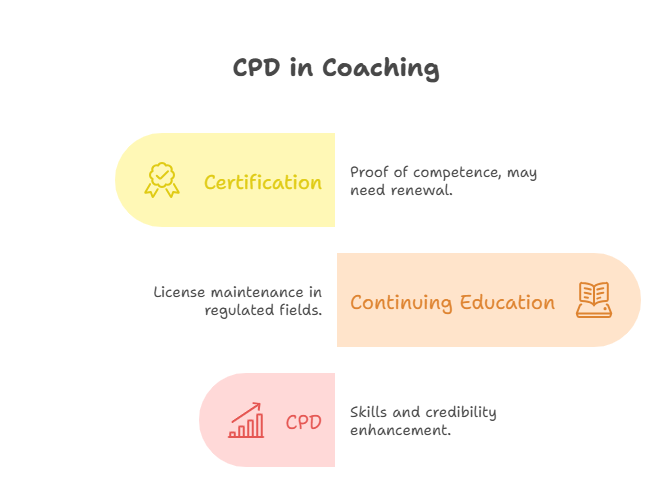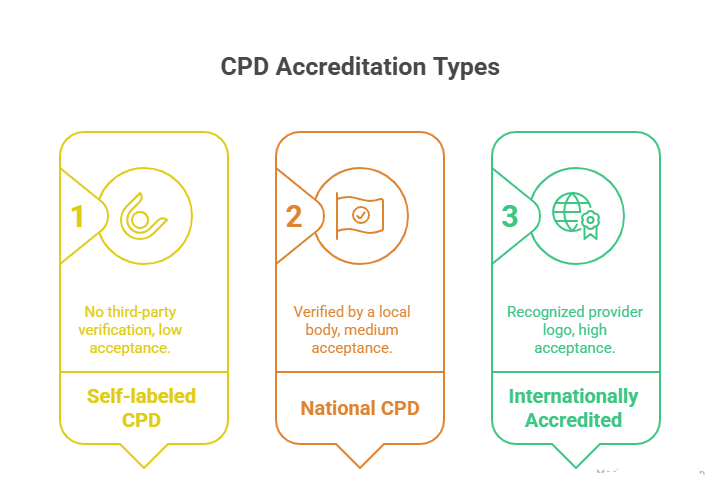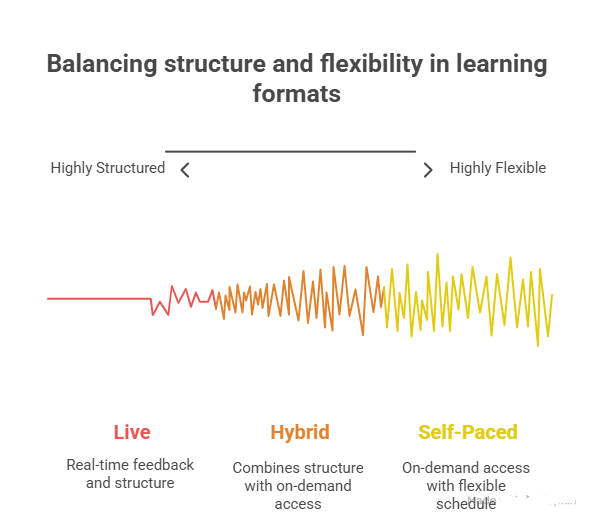How to Choose the Right CPD Courses for Coaches
Continuing Professional Development (CPD) has moved from a “nice-to-have” to a non-negotiable standard in coaching. With the coaching industry projected to exceed $25 billion globally by 2026, professionals are under more pressure than ever to prove their credibility—not just by claiming expertise but by demonstrating it through structured learning. CPD isn’t about collecting certificates; it’s about remaining relevant, ethical, and impactful in a field that demands constant personal and professional evolution.
But not all CPD courses deliver on that promise. The explosion of online certifications means it’s easy to waste time and money on programs that are unrecognized, outdated, or overly academic. Choosing the right CPD course shapes your coaching identity, sharpens your skills, and determines whether clients see you as a hobbyist or a trusted transformation partner. One poor decision can stall your entire coaching trajectory—and that’s why precision in course selection matters more than ever.
Understanding CPD in Coaching: What It Really Means
CPD vs. Certification vs. CE: Key Differences
CPD (Continuing Professional Development), certification, and continuing education (CE) are often lumped together, but they serve radically different purposes in a coach’s career. Certification is typically a one-time credential that signals you've met a baseline competency—such as completing a foundational coach training program. CE, on the other hand, is usually tied to licensed professions (like counseling or healthcare) and requires specific topic hours to maintain legal credentials.
CPD goes further. It represents a coach’s ongoing effort to improve their expertise, stay updated with industry trends, and deepen their applied skill set. While certification can expire or become irrelevant, CPD is fluid, cumulative, and future-focused. It includes seminars, practical workshops, supervision hours, peer-reviewed learning, and real-world case-based modules. Coaches who prioritize CPD aren't just staying compliant—they’re building authority in a field that rewards adaptive, lifelong learning.
Why CPD Is Mandatory for Professional Coaches
In the absence of strict licensure, CPD acts as a trust signal for clients and employers. The coaching space is unregulated in many regions, which means anyone can technically call themselves a coach. What separates professionals from amateurs is not just their talent—but their dedication to ongoing development.
Many global coaching bodies, such as the International Coach Federation (ICF), require CPD hours to maintain membership or credentials. But beyond compliance, CPD ensures you’re not relying on outdated frameworks when dealing with complex client challenges. For instance, a coach trained pre-2020 may not be equipped to handle burnout, hybrid workforce stress, or trauma-informed coaching—all of which are now dominant client themes.
Coaches who fail to engage in structured CPD often plateau. Those who invest in it evolve faster, attract higher-paying clients, and are more likely to be recommended for corporate contracts or speaking engagements. In a results-driven industry, your learning curve defines your income ceiling.
Evaluating Course Content Quality and Depth
Practical Tools vs. Theoretical Filler
A common trap in CPD course selection is mistaking volume for value. Some programs drown learners in dense theory with little practical application. The best CPD courses for coaches prioritize immediately usable tools, frameworks, and exercises that can be integrated into sessions the same week.
Ask: Does the course provide role-play templates, coaching scripts, goal-tracking sheets, or diagnostic tools? If it’s all lectures and slides, you're likely investing in academic filler—not professional development. Look for programs that teach not just “what coaching is,” but how to coach in real time, with emotional nuance, accountability structures, and measurable outcomes.
Exceptional CPD doesn't just teach theory; it helps you translate it into client transformation tools, whether it’s through positive psychology assessments, NLP frameworks, or behavior-change protocols. These are what sharpen your edge in a saturated market—not just knowledge, but application mastery.
Real-World Coaching Scenarios and Case Studies
Elite CPD courses embed real-world case studies and interactive coaching scenarios throughout the curriculum. Why? Because coaching doesn’t happen in controlled settings—it happens in messy, human moments full of resistance, emotion, and contradiction. If your training doesn’t prepare you for that, it’s incomplete.
Look for programs that let you dissect actual client dilemmas: clients who ghost, resist accountability, or present with masked trauma. Courses should walk you through live supervision examples, show how coaches pivot mid-session, and explore ethical gray zones like over-dependence, cultural bias, or boundary breaches.
When case studies are missing, it’s a red flag. It likely means the course was built by academics, not practitioners. The strongest CPD providers ensure that you’re trained to handle complex personalities, emotional volatility, and diverse sociocultural contexts. That’s what clients pay for—and what earns you repeat referrals.
| Course Focus | Red Flags | Ideal CPD Feature |
|---|---|---|
| Overloaded Theory | No practical application; dense slides without tools or examples | Coaching scripts, ready-to-use templates, and integration guides |
| Outdated Models | Lack of supervision, absence of updated practices or frameworks | Case-based learning, live coaching scenarios, and model refreshers |
| Academic-style Curriculum | Generic quizzes, theoretical focus, no tools for real coaching | Diagnostics, behavior change protocols, and session-ready tools |
Accreditation and Recognition: What to Check
CPD Accredited vs. Non-Accredited: Red Flags
Not all CPD courses are created equal, and the presence—or absence—of proper accreditation is the fastest way to spot a credible provider. A legitimate CPD program should be backed by a recognized accrediting body such as CPD Certification Service (UK), ICF, or NBHWC. These organizations ensure the course meets global standards of depth, structure, and ethical alignment.
If a course claims CPD hours but has no visible verification from these bodies, it’s a red flag. Always confirm accreditation through the official directory or the provider’s profile on the accrediting body’s site. Vague mentions of “international CPD standards” without a logo or link usually mean there is no actual affiliation.
Also beware of providers offering “lifetime access” with no update cycles. A course that hasn't been reviewed or renewed in the last 24 months is almost certainly outdated. True CPD evolves with the profession, not just sits on a server.
International Recognition and Employer Credibility
In coaching, credibility is mobile—especially if you work with international clients or want to enter corporate coaching contracts. This is where international CPD recognition becomes a make-or-break factor. Courses recognized across regions (e.g., North America, Europe, Asia-Pacific) are more likely to carry employer weight and client trust.
Check whether the CPD program appears on LinkedIn profiles of credible coaches or industry consultants. If your future clients search for your course name and find nothing, that undermines your perceived authority. Better programs will be mentioned in hiring pipelines, RFPs, or HR development plans.
Additionally, multinational employers and coaching platforms increasingly screen for CPD-accredited training as part of their vetting process. Skipping this step may limit you to solo practice and prevent entry into enterprise-level contracts or regulated niches like health coaching or mental wellness.
Delivery Format and Schedule Fit
Self-Paced, Live, or Hybrid: What Suits You?
CPD courses today offer three core formats: self-paced, live instructor-led, and hybrid models. The best choice depends entirely on how you learn, your availability, and the type of coaching environment you're preparing for.
Self-paced courses offer flexibility, letting you learn at your own rhythm. They're ideal if you're balancing coaching with another career or parenting. But they require high discipline—and may lack interaction or feedback loops that sharpen real-time decision-making.
Live CPD programs bring structure, accountability, and immediate feedback from facilitators or peers. They often include breakout sessions, live demonstrations, and real-world Q&A—critical elements for building confidence and communication flow. However, their rigid scheduling may conflict with a coach’s unpredictable hours.
Hybrid formats tend to offer the best of both: recorded modules for flexibility, plus live elements for application and reflection. These are especially useful for new coaches who want both technical depth and relational mastery without sacrificing calendar freedom.
Choosing the wrong format can lead to burnout, disengagement, or incomplete mastery. So consider how you’ll stay consistent, how often you'll apply what you learn, and whether the format matches your long-term coaching delivery style.
Time Commitments and Burnout Risks
Too often, coaches enroll in CPD programs without fully assessing the time burden—and this leads to dropouts or unfinished certifications. Many courses advertise 20 hours of training, but that excludes homework, integration tasks, or required peer coaching.
Before enrolling, get clarity on:
How many actual learning hours are expected weekly
Whether there are deadlines or fixed cohorts
If there’s a grace period or module access limits
Burnout risk is especially high for coaches juggling clients, marketing, admin, and personal obligations. If you’re already stretched thin, avoid programs that compress 50+ hours of material into 3-week bootcamps unless you can go all in.
The right CPD program should feel energizing—not draining. It should integrate with your work-life rhythm, not bulldoze it.
Budget, ROI, and Long-Term Career Impact
Pricing vs. Outcomes: Don’t Just Look at Cost
Too many coaches fall into the trap of selecting CPD courses based on price alone, thinking that low-cost equals smart investment. But in coaching—where your skills are your product—the cheapest course often becomes the most expensive mistake.
Instead of fixating on cost, ask: What will this course help me do that I can’t do today? Will it help you:
Coach more complex clients?
Land higher-paying contracts?
Position yourself for niche specialization?
CPD should have a clear skills-to-outcomes pathway. If the curriculum doesn’t show what deliverables or competencies you’ll walk away with—whether it's trauma-informed frameworks, habit-change models, or corporate coaching strategies—it’s not worth the money, no matter how “affordable” it seems.
You’re not buying content—you’re buying career leverage. And in a market that rewards specialization and confidence, the ROI of a solid CPD course can often be 10x the initial investment within a year.
Course Reviews, Testimonials, and Alumni Outcomes
Before enrolling in any CPD program, examine what past graduates are doing now. Are they thriving in paid coaching roles, speaking at conferences, launching businesses—or stuck redoing certifications elsewhere? Alumni outcomes are your strongest indicator of real-world value.
Don’t just look at reviews on the provider’s site. Cross-check names and outcomes on:
LinkedIn
Professional coaching directories
Online forums or alumni Facebook groups
Look for mentions of transformation, not just satisfaction. Words like “life-changing,” “finally got clients,” or “tripled my income” are far more telling than generic praise like “nice videos” or “clear material.”
Also consider how active the alumni network is. Courses that offer ongoing peer support, mentorship, or referral pipelines tend to produce more successful coaches. The best CPD providers stay invested in their graduates long after the final module ends—because your success is their reputation.
| Evaluation Area | Low-Quality Course | High-Impact CPD Course |
|---|---|---|
| Pricing | Inexpensive but vague outcomes with no clear skill roadmap | Pricing reflects skill ROI and practical, high-leverage outcomes |
| Reviews | Generic praise, no specific impact or real alumni evidence | Testimonials highlight client wins, business growth, or hires |
| Career Leverage | Limited to generalist roles with unclear specialization path | Enables niche positioning and access to premium coaching tiers |
Why the ADHLC Certification Offers All-in-One CPD Learning
The Advanced Dual Health and Life Coach Certification (ADHLC) by ANHCO isn’t just a CPD course—it’s an integrated, career-building platform designed for real-world coaching mastery. With over 500 CPD-accredited modules, it offers an unparalleled scope of learning across emotional intelligence, behavior change, trauma-informed practices, and wellness coaching.
Unlike fragmented CPD courses that require piecing together theory from multiple sources, ADHLC offers a seamless ecosystem of skill-building. You’re not just learning isolated techniques—you’re building a cohesive coaching identity, rooted in internationally recognized standards and practice.
Built-In CPD Recognition That Matters
Every module inside the ADHLC program is backed by verified international CPD accreditation, ensuring global recognition. This gives coaches the confidence to:
Show CPD hours during client onboarding
Meet CE or membership renewal requirements with ease
Bid on contracts or agency work without additional verification
That CPD status isn’t symbolic—it’s operational. Many graduates use their ADHLC training to access regulated health coaching roles, expand into corporate wellness, or train others.
Tools, Supervision, and Real Coaching Scenarios
The program includes live mentoring sessions, downloadable toolkits, role-play assignments, and real case simulations. You’re not left to interpret theory—you get hands-on implementation, feedback from credentialed mentors, and templates you can reuse with clients immediately.
Some standout inclusions:
Habit tracking and cognitive reframing tools
Client onboarding templates and session plans
Trauma-informed coaching scripts
Emotional regulation protocols
These aren’t just academic features—they’re what separate “trained” coaches from hired ones in competitive niches.
Flexibility Meets Depth
The ADHLC is fully self-paced but structured with optional live coaching labs and accountability pathways. That means you can move quickly through known material but go deeper where it matters, revisiting modules as your practice grows.
Whether you’re just starting or already certified but underwhelmed, ADHLC functions as a comprehensive CPD and credentialing route—designed to evolve with you. It doesn’t just tick a CPD box. It rewires how you coach.
Frequently Asked Questions
-
A legitimate CPD course must be formally recognized by a professional development body, such as the CPD Certification Service, ICF, or NBHWC. It should offer structured learning with clearly defined learning outcomes, assessment criteria, and a verifiable certificate of completion. Beware of courses labeled “CPD” without proper accreditation—they often lack rigor and industry relevance. A real CPD program will include practical coaching applications, relevant theory, and documentation of completed hours. Additionally, look for instructor credentials, alumni reviews, and real-world assignments. If you're unable to verify the program's standing through the accreditor’s official website or registry, it’s a red flag. High-quality CPD adds measurable value, not just more content.
-
Yes, most professional coaching organizations—such as ICF, EMCC, or NBHWC—accept CPD hours from online CPD-certified programs, provided those courses meet specific standards. The course must be structured, time-bound, and include either an assessment or reflective practice component. Passive content, like YouTube videos or unstructured webinars, usually won’t qualify unless they’re part of a certified track. Always document your learning with certificates, timestamps, and course descriptions. Some organizations may require a certain percentage of live or supervised hours, so it’s best to mix self-paced and interactive CPD options. Check your organization's CPD renewal policies carefully to ensure your online hours align with their specific criteria.
-
There’s no universal rule, but most professional coaching bodies recommend completing between 20 to 40 CPD hours annually. The exact number depends on your level of certification, niche, and membership type. For example, ICF requires coaches to renew every three years with 40 hours of CPD, including ethics training. If you’re working in regulated environments like health or executive coaching, expectations may be higher. More important than the number is the relevance: CPD hours should expand your practical competencies, update you on new methodologies, and fill gaps in your current coaching approach. Quality over quantity always wins when it comes to maintaining your edge.
-
Yes—internationally accredited CPD courses offer far more than just learning material. They give your coaching profile global credibility, helping you attract clients across borders, apply for enterprise contracts, and align with corporate or healthcare standards. These courses are also more likely to be accepted by multiple professional bodies, saving you from taking redundant certifications later. While they may cost more upfront, the return on investment is often significantly higher in terms of authority, visibility, and client trust. Think of international accreditation not just as a stamp, but as a filter that weeds out low-quality content and elevates your market positioning.
-
Absolutely. In fact, CPD is one of the fastest, most targeted ways to pivot into a specialized coaching niche—whether that’s trauma-informed life coaching, corporate wellness, executive leadership, or integrative health. Specialized CPD courses focus on advanced tools, case studies, and ethical boundaries specific to that field, giving you both technical confidence and niche credibility. They also help you refine your value proposition and speak the language your ideal clients respond to. If you’re already a generalist coach, CPD can be your strategic bridge into premium coaching segments, letting you charge more, scale faster, and differentiate in a crowded space.
-
Scan the syllabus. If most modules cover topics like “What is coaching?” or “How to structure a session,” and you’ve already been coaching professionally, it's likely too basic. You should also check the entry requirements—advanced CPD programs often list prerequisites like previous certifications or client hours. Another giveaway is the learning outcomes: if they’re vague or focused on surface-level outcomes (e.g., “gain confidence”), the course probably won’t stretch you. Look for programs that offer advanced skills like trauma navigation, coaching for neurodivergence, systemic change models, or applied neuroscience. At your level, CPD should challenge your assumptions—not just refresh your memory.
-
Yes—especially in health, executive, and corporate coaching sectors. Many agencies, wellness platforms, or corporate vendors require proof of up-to-date CPD training as part of their onboarding or credentialing process. This isn’t just about checking a box—it’s about risk mitigation. Employers want to know their coaches are trained in current best practices, understand boundaries, and are equipped to handle ethically sensitive situations. If you’re bidding on contracts, submitting proposals, or applying to work under someone else's brand, expect your CPD certificates to be audited and verified. It’s a standard part of professional due diligence—and a competitive differentiator for those who maintain theirs.
The Takeaway
Choosing the right CPD course isn’t about popularity, price, or flashy branding—it’s about strategic alignment with your coaching goals. In an industry where credibility is earned through outcomes, not opinions, your learning choices define how far you go. The right CPD program sharpens your practical edge, deepens client results, and signals to employers and clients that you take your profession seriously.
Don’t settle for filler, outdated content, or unchecked promises. Look for internationally accredited programs, verified tools, live support, and real-world application. Whether you’re scaling a solo practice or stepping into specialized niches, your CPD path should feel like an upgrade—not a checkbox.
If you want a single program that delivers depth, recognition, and tools that matter, the Advanced Dual Health and Life Coach Certification (ADHLC) by ANHCO remains one of the few options designed to evolve with you, not expire on you.




